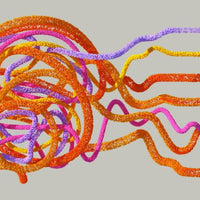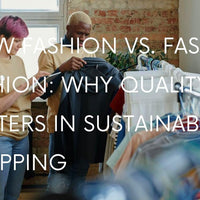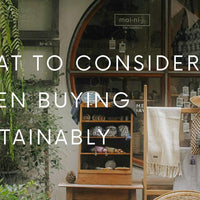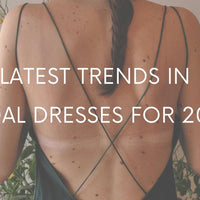Jewellery may be frivolous and thrilling, it may be sentimental and nostalgic, but the reality of production can be a different story.
As with all areas of fashion it is very easy to overlook the journeys our products have been a part of. In an era of disposable, cheap and fast fashion, we need to take a very important step back and reassess why and how products are made and delivered to the consumer.
The jewellery industry is one laden with controversy and occasionally alleged corruption. Unethical sourcing of gemstones and metals, in particular Gold - can have catastrophic effects on communities, their people and their environments.
When one first begins looking into the ethics of mining, it can feel overwhelming. An initial gut reaction may be to boycott the industry. However, according to the Fairtrade Foundation “an estimated 100 million people worldwide rely on small-scale mining to support their families and communities”. This means the answer is not to avoid and abandon the industry, but to push and fight harder for fairer, ethical mining and sourcing that supports these artisans and small-scale miners.
We need to push for fair pay, environmental protection and health and safety regulations.
Fair Pay:
When no monitoring is put in place, small scale miners are very often exploited financially by being offered worryingly low prices in exchange for precious metals and are given no other choice but to accept. With such low payments being made, these miners are unable to make a fair living and are prevented from investing in safe equipment. So as a result, people are forced to continually work in dangerous and unhealthy conditions.
Health and Safety:
It’s a serious concern that mercury is often used to extract precious metals, with no safety regulations in place. Mercury is a toxin which sadly causes harmful effects to the human body such as birth defects, kidney damage, digestive and immune disorders as well as having a serious deleterious effect on water supplies, fish and environmental contamination. Without proper investment and pay, miners are unable to handle these chemicals safely thus being unable to protect themselves and their surrounding environment.
Precious Gemstones:
Gemstones are equally troubling when we begin to look deeper into their sourcing and supply. Rubies, Sapphires, Emeralds and Diamonds to name a very few are often subject to exploitation. Not only can the sourcing put human life and the environment at risk, but the journeys that the precious stones take are also highly vulnerable to corruption and conflict. Knowing where your gemstone comes from and the journey it took is the suppliers' and jewellers' and maybe to some extent the consumers' responsibility. We have to work together - it is time to buy mindfully and to start to think of the wider implications before we purchase.

The good news…
The good news for gold is that Fairtrade has done incredible work to ensure artisans and miners work in safe and non-hazardous conditions with strict requirements when mining for precious metals. These requirements include: safe handling of chemicals when used, environmental protection, women's rights and child labour protection. Fairtrade also ensures a fair price is always given for the gold, in line with global prices thus avoiding the previously mentioned exploitation. Buying ethically sourced metal means you are supporting an industry that so many rely on for their livelihood, whilst ensuring the process minimises risk and corruption.
With regards to gemstones, although there is not one governing body to ensure ethical mining is promoted and followed, there are a number of programmes and mines around the world that are committed to sustainably sourcing using high-tech and safe equipment. Certain places even run projects such as reforestation and water filtration systems as a way of protecting the land and communities.
Now what..
With regards to wider accessibility: due to ethically sourced materials currently costing more, sustainable jewellery is sadly perceived as a “luxury item’ - but this does not have to be the case. Although it is true that ethically sourced jewellery will come at a slightly higher price, this doesn't mean it should be thought of or sold as an exclusive product. If that were to be the case, sustainable fashion would never become mainstream and no noticeable changes to this huge industry would ever occur.
To encourage and speed up change in perception, such change has to come from designers and ultimately consumers. It’s the good-old supply and demand story… the more demand there is for ethical jewellery, the more investment and support these organisations will get.
The question is: Do you really want to adorn yourself with jewels at the cost of someone else's well-being and environmental harm?
Thankfully a number of jewellers such as Hammered are starting to encourage and offer another alternative. Hammered is a London based enterprise run by jewellery designer Aimee Schmidt that works hard to offer an ethical solution without massively inflating the price tag. Hammered is 100% committed to producing contemporary jewellery that looks deeper behind the fashion. It was formed from a passion for design and a passion to change the status quo in the jewellery industry, proving sustainably sourced highly desirable jewellery doesn’t have to be unattainable and elitist!
About the writer:
Aimee Schmidt is a jewellery designer living and working in London, UK. She is passionate about society’s responsibilities for promoting and securing ethical and sustainable sourcing of materials. Accordingly Aimee supports Fairtrade gold and uses ethically sourced metals and gemstones in her pieces.
Her signature designs are characterised by hammered textures, reflected in her company name and are inspired by architectural and structural forms.








0 comments